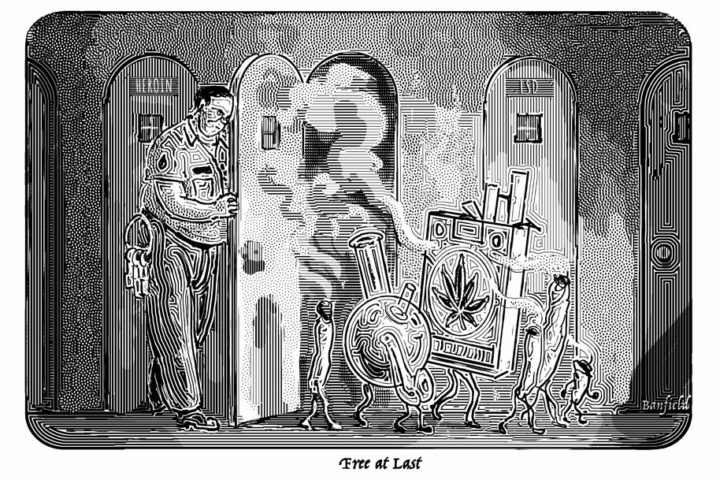In a not exactly Churchillian 2012 Foreign Affairs cover story, “Why Iran Should Get the Bomb,” distinguished professor Kenneth Waltz argued that “a nuclear armed Iran would be…the best possible result,” as Iran is rational, and a balance to Israel’s nuclear weapons would stabilize the Middle East.
Iran is indeed rational—according to its aims. Reason ascends from postulates. Accepting the postulate that the Jews must be exterminated, the Final Solution was rational. And as for stabilizing the Middle East, we see every day, even absent a nuclear backstop, Iran’s depredations.
Those who posit that Israel’s certain nuclear retaliation would keep a nuclear Iran in check ignore, variously, the Shiite theology of martyrdom; a gamble that Israel’s retaliatory capacity would be eliminated in a first strike; and, more pertinently, in a conventional battle that Israel was losing, the neutralization of its nuclear deterrent. Only Israel’s regional nuclear monopoly saved it in 1973, when little stood between the Egyptian army and Tel Aviv.
A nuclear armed Iran would dominate the Middle East even more than it now does. The threat to Europe would further cleave European and U.S. interests in the area, America would be further expelled, and the Sunni states subordinated or conquered. Not surprisingly, conventional wisdom fails to foresee this outcome just as it failed to foresee today’s Iranian domination from Afghanistan to the Mediterranean, a trick the United States at the height of its postwar hegemony could not accomplish via the failed Central Treaty Organization (CENTO) Treaty. Among other things, the conventional wisdom takes no account of the broader context, which in this case is what Iran sees when it looks at the world, and therefore what it wants, expects, and will try to accomplish.
A cowardly Gallic insight—valuable in that it dovetails with Iranian conceptions—was recently expressed in the Le Figaro headline, “Une leçon à méditer pour Trump: même Rome n’a pas réussi à conquérir la Perse!” (A lesson for Trump to meditate upon: even Rome did not succeed in conquering Persia!)
Unlike most Americans, who—though it is they who will ultimately decide American policy toward Iran—cannot find it on the map, Iran looks upon the world and sees a demographically hot Muslim population heading toward 2 billion, Islamic countries stretching from Indonesia through Morocco, 141E to 17W—almost half the globe—and from Kazakhstan through sub-Saharan Africa. Large Islamic populations elsewhere include 44 million in Europe. Though they are often savagely divided and, on the whole, predominantly peaceful, in Iran’s eyes Muslims share the common goal of a unified ummah and the Islamization of the world. We may perceive permanent schism, but, like either the Allies or the Axis in World War II, Islamists see unity after future victory.
The tide of Islam once surged to the gates of Paris and Vienna; Spain and Sicily were Arab, the Mediterranean a pirate lake. Now, in a declining Europe emasculated by the world wars and wolfing down the suicidal poisons of modernity, Muslims have a fair bid at becoming the majority, and Islam the dominant, unforgiving belief system. Active with extraordinary chutzpah in the politics of Western nations (perhaps “chutzpah” is the wrong word, but how else to describe the work of Ilhan Omar and Rashida Tlaib?), adherents of aggressive Islam appear to Tehran the way American pioneers appeared to Bostonians, as advance agents of manifest destiny.
* * *
The Islamic doctrine of taqiya, fundamental to Shia theology, allows lying to unbelievers. Iranian Foreign Minister Javad Zarif: “When did we say we want to annihilate Israel?” The answer is: all the time, such as when Ahmad Alamolhoda, a deputy of the supreme leader, said in September, “Israel will be totally demolished within half a day,” or when the commander of the Iranian Revolutionary Guard Corps, Hossein Salami, claimed “the capability to annihilate” Israel, which “must be wiped off the world geographic [map].”
Monsieur Salami tellingly followed this with: “In the second step we will be thinking of the global mobilization of Islam.” Apparently, Mr. Alamolhoda concurs: “Iraqi Hashd al Sha’bi, Lebanese Hezbollah, Yemeni Ansarallah, Islamic Jihad and Hamas in Palestine, and the Syrian Homeland Front are all part of Iran,” because “Iran is no longer limited to its borders.”
The Islamic, Mongol, Spanish, Napoleonic, and Hitlerian conquests may seem remote to that subset of Americans aware of them. Even the most knowledgeable among us cannot entirely escape the traditional fallacy that we are perfectly shielded by the oceans. And a quick glance at relative strengths renders any idea of an Iranian threat to the U.S. seemingly ridiculous.
But couple a medieval sensibility, thirst for payback, the tradition of martyrdom, and absolute belief in religious destiny, with nuclear weapons, ICBMs, and even lesser-range missiles sea-launched from freighter decks or over the side, and you have the kind of imaginative, asymmetric scenarios that have changed history from the beginning of time. Only one or two relatively low-yield nuclear detonations over the United States could produce an electromagnetic pulse that would in a relatively short time destroy the nation. Unless Iran is stripped of its nuclear potential—a gift of multiple American administrations, some far more than others—in the near future we will be facing a new and perilous front.
Throughout history, great convulsions have required inspiration, will, mobilization, and resources approximately balanced with those of the order to be overturned. The advent of nuclear weapons, other means of mass destruction, and the technological fragility of advanced states means that resources need no longer approximate those of the intended target. Therefore, it is essential to know the mind and intent of enemies that not so long ago could be justifiably dismissed.
Persia was once master of most of the classical world, and Islam had in its sights dominion over the known world. Iran sees this not as something forever remote, but as the inevitable and beckoning light ahead.


